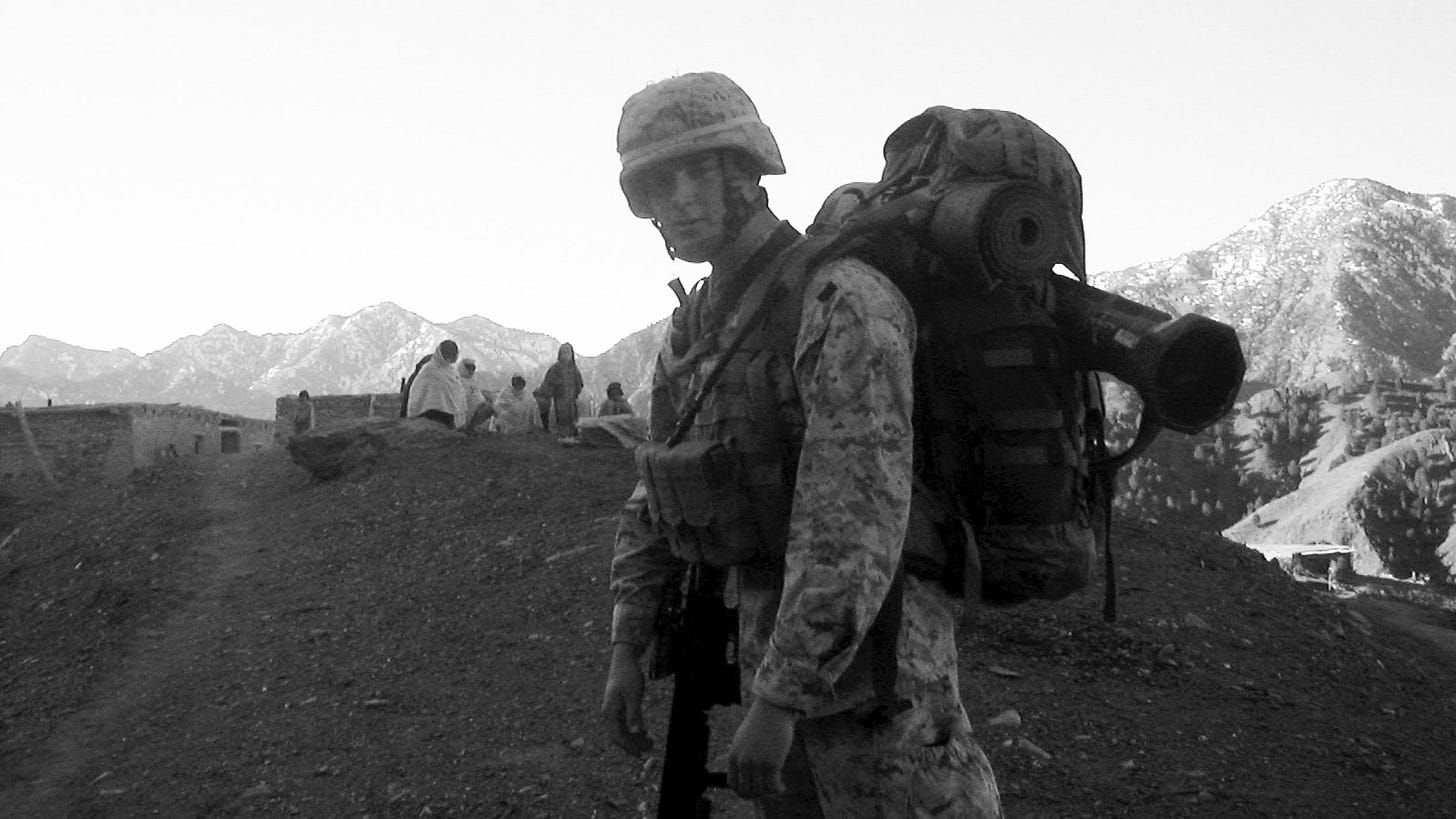The Ruck is a newsletter dedicated to unpacking national security, written by me, Paul Szoldra, a U.S. Marine Corps veteran and writer who has worked in this world for over two decades.
About me
My career began after 9/11 in the Marine Corps infantry, sleeping in the dirt and carrying a rucksack on patrol in forests, jungles, deserts, and mountains.
After one such patrol in Afghanistan in 2005, I wrote to a high school friend: “This isn’t much of a war these days, and I have to ask myself all the time what the hell I’m doing here.”
That was before a truck in front of me exploded and jolted into the air, landing with both front tires trapped in a crater made by a bomb in the road no one had suspected was there. I came home, was made a combat instructor, and trained thousands of my fellow grunts on infantry tactics, patrolling, and marksmanship. The most important lesson was always left unsaid: get home alive. Some of them did not.
For the past two decades, I've observed the endlessly fascinating and perplexing world of national security—starting as a U.S. Marine after 9/11, then as the Military and Defense Editor at Business Insider, Executive Editor of We Are The Mighty, Founder and Editor of the influential military satire publication Duffel Blog, and most recently as Editor in Chief of Task & Purpose. Today, I work in the defense technology industry.
And now, I’m here with you. Welcome to The Ruck.
What to expect in The Ruck
National security leaders have a long history of being "100% right 0% of the time" about where U.S. troops may end up next in combat. But the U.S. military almost certainly isn’t prepared for the rise of China, advances in artificial intelligence, or the stunning proliferation of drones worldwide. It now struggles to convince a dwindling recruiting pool to sign up and replenish the ranks. And despite a Pentagon budget fast approaching $1 trillion—yes, $1 trillion in taxpayer dollars—service members have computers and software that often don’t work, aircraft overhead designed with the utmost inefficiency the federal government can buy, and leaders who can’t protect them from mold or military-grade poison.
Here at The Ruck, I plan to explain these topics, deliver vital insight from my network, and present original analysis and reporting on the U.S. military's role now and in the future.
My goal: Unpack the future of national security with clarity, skepticism, and wit—free of confusing jargon, unchallenged government talking points, military acronyms, scare-mongering, aggravating ads, or clickbait—delivered straight to your inbox.
Thanks for joining me.
—Paul

👉🏻 You can send me links, tips, questions, or comments to my secure email: paulszoldra@protonmail.com. And if you know someone who might like The Ruck, consider forwarding or sharing it on social media. It would mean the world to me. Thank you!
Praise for The Ruck
Ethics statement
At The Ruck, I will strive to cover national security as impartially as possible. But I also believe that being honest and upfront with readers is essential, and the truth is, impartiality is a worthy but complicated goal. As Robert Kaplan observed in 2004, “though journalists assume the mantle of professional objectivity, a writer brings his entire life experience to bear on every story and situation. A journalist may seek different points of view, but he shapes and portrays those viewpoints from only one angle of vision: his own.”
I certainly agree with that. Anyone who spends decades observing national security will likely form an opinion. But I will clearly distinguish between opinion and analysis when I veer into either. At any rate, I will adhere to the Society of Professional Journalists' code of ethics at all times, which requires journalists to:
Seek truth and report it.
Minimize harm.
Act independently.
Be accountable and transparent.
A note on sources
I created The Ruck to provide news and analysis on national security so that readers can use it to make sound decisions. Sources include firsthand interviews, unclassified government sources, think tank reports, news reports, social media posts, and many other open sources. I usually link directly to where it was found to benefit readers.
Sometimes, however, facts or quotes must be sourced anonymously. This is often because a source has reason to believe that sharing such information with a journalist may put them at risk. Military members, especially, often trust me to report unclassified information without saying where it came from to avoid an ass-chewing or worse. I am grateful for their trust and will never betray it. So if the information is newsworthy and verified, I will report it and describe the source's background to the extent possible or sometimes, not at all.







